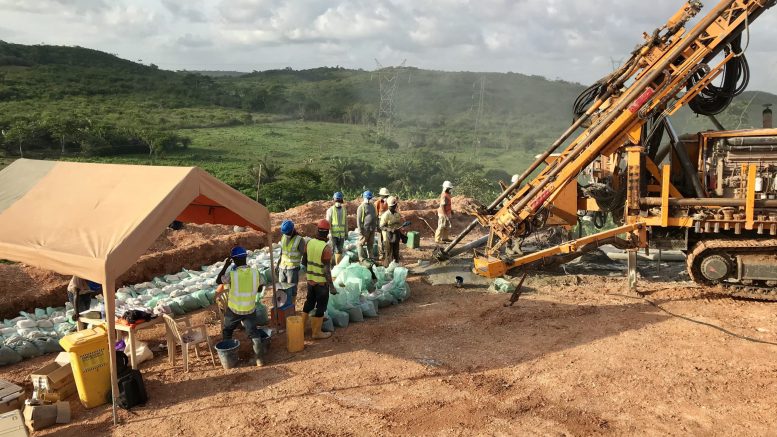African-focused Atlantic Lithium (AIM: ALL; ASX: A11) says a new feasibility study for its hard-rock Ewoyaa project in Ghana increases net present value and free cash flow even as building costs grow by almost half compared with a study last year.
The Ewoyaa spodumene project, about 120 km west of the capital, Accra, has an after-tax net present value of US$1.5 billion at an 8% discount rate with free cash flow of US$2.4 billion from US$6.6 billion in revenue over the mine’s 12-year life, Sydney-based Atlantic said in a release on Thursday. That compares, respectively, with US$1.3 billion, US$2 billion and US$5 billion in a pre-feasibility study released in September. Capital costs rose 48% to US$185 million from US$125 million.
The project has a 105% internal rate of return and a 19-month payback period. It increased capital spending to include modular dense media separation (DMS) processing units earlier in the mine life to increase output to 2.4 million tonnes a year from 2 million tonnes, Atlantic CEO Keith Muller said in the release. Production would start in the second quarter of 2025 with full commissioning in early 2026.
“Early revenue generated by the modular DMS units will reduce peak funding requirement for the mine build, strongly justifying these developments,” Muller said. “This will provide a valuable opportunity to train national staff and engineer out any mining, materials handling or logistics bottlenecks ahead of large-scale operations.”
Ewoyaa is incorporating the DMS units in phase one because it now holds 25.6 million probable tonnes grading 1.22 Li2O versus 18.9 million probable tonnes grading 1.24% last year. The plant would produce 3.6 million tonnes of 6% and 5.5% spodumene concentrate over the mine’s life.
Cash operating costs are pegged at US$377 per tonne and all-in sustaining costs at US$610 per tonne, the company said. That compares with operating costs of US$278 per tonne in the prefeasibility study.
‘Positive’ study
Canaccord Genuity said the feasibility study is positive despite the expense increases. The project has “excellent economics as a low-cost and capital-intensive asset,” mining analyst Alex Badwany wrote in a note on Thursday. “Investors may be slightly disappointed with the higher unit costs,” which were primarily due to a higher average strip ratio, he said. “However, in the overall market, Ewoyaa continues to represent some of the strongest upside among its peers.”
The analyst’s modelling suggests capital costs could increase to US$200 million. But Atlantic’s arrangement for Piedmont Lithium (NASDAQ: PLL) to acquire as much as half the project through investment, including US$70 million towards capital costs and a 50-50 split thereafter, will alleviate the burden on Atlantic, Badwany said.
Atlantic is still envisioning producing secondary lithium products to help reduce costs, it said. Processing would create 4.7 million tonnes of 1.16% lithium it could sell for US$186 per tonne. It would also produce 500,000 to 1 million tonnes a year of feldspar, although that income, which could be around US$50 per tonne, hasn’t been included in the cost calculations. Feldspar would supply the local ceramics market, Atlantic said.
The open-pit project envisions three stages of crushing and dense media separation to produce a spodumene concentrate for carbonate, sulphide or hydroxide conversion, Muller said.
“Due to its grade, the project’s coastal location and against the backdrop of the global decarbonisation movement, demand from off-takers for product from Ewoyaa has been strong,” he said. “The project benefits from a low water and energy-intensive plant, close proximity to exceptional infrastructure, including adjacent grid power.”
Shares in Atlantic Lithium closed 13% lower at 26 pence apiece on Thursday, valuing the company at £158.3 million as the wider market in London declined. It’s traded within a 52-week range of 19.7 pence to 52.2 pence.


Be the first to comment on "Atlantic Lithium feasibility study adds heft and cost to Ghana project "